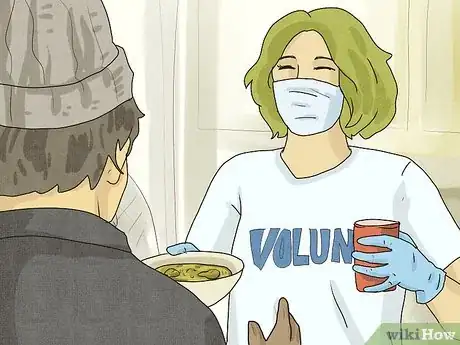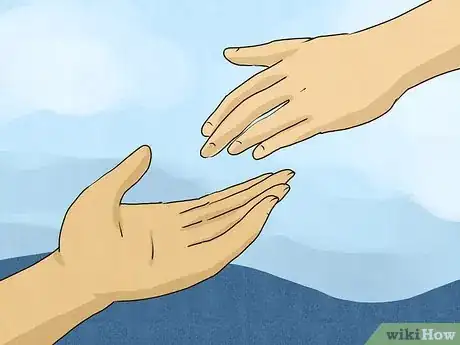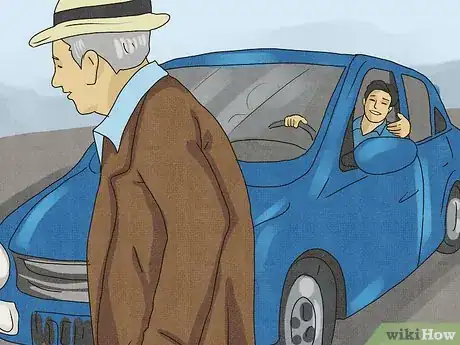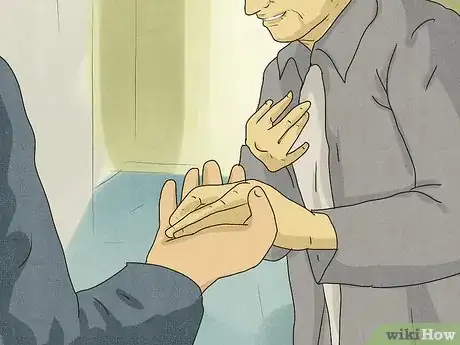This article was co-authored by Julia Yacoob, PhD. Dr. Julia Yacoob is a Licensed Clinical Psychologist practicing in New York City. She specializes in Cognitive Behavioral Therapy (CBT) for adults coping with a variety of symptoms and life stressors. Dr. Yacoob earned an MS and Ph.D. in Clinical Psychology from Rutgers University, and pursued specialized training at Weill Cornell Medical College, New York Presbyterian Hospital, Memorial Sloan-Kettering Cancer Center, the Institute for Behavior Therapy, and Bellevue Hospital Cancer Center. Dr. Yacoob is a member of the American Psychological Association, Women’s Mental Health Consortium, NYC Cognitive Behavioral Therapy Association, and Association for Cognitive and Behavioral Therapies.
There are 8 references cited in this article, which can be found at the bottom of the page.
wikiHow marks an article as reader-approved once it receives enough positive feedback. This article received 11 testimonials and 83% of readers who voted found it helpful, earning it our reader-approved status.
This article has been viewed 260,292 times.
Selflessness basically means that you’re more concerned about others’ feelings and wellbeing than your own. It’s safe to say that the world would be a much better place if we were all a little more selfless. It starts at the individual level, so you can start making that change today! There are tons of easy ways to start being more selfless in your everyday life.
Steps
Expert Q&A
-
QuestionWhat is considered a selfless act?
 Julia Yacoob, PhDDr. Julia Yacoob is a Licensed Clinical Psychologist practicing in New York City. She specializes in Cognitive Behavioral Therapy (CBT) for adults coping with a variety of symptoms and life stressors. Dr. Yacoob earned an MS and Ph.D. in Clinical Psychology from Rutgers University, and pursued specialized training at Weill Cornell Medical College, New York Presbyterian Hospital, Memorial Sloan-Kettering Cancer Center, the Institute for Behavior Therapy, and Bellevue Hospital Cancer Center. Dr. Yacoob is a member of the American Psychological Association, Women’s Mental Health Consortium, NYC Cognitive Behavioral Therapy Association, and Association for Cognitive and Behavioral Therapies.
Julia Yacoob, PhDDr. Julia Yacoob is a Licensed Clinical Psychologist practicing in New York City. She specializes in Cognitive Behavioral Therapy (CBT) for adults coping with a variety of symptoms and life stressors. Dr. Yacoob earned an MS and Ph.D. in Clinical Psychology from Rutgers University, and pursued specialized training at Weill Cornell Medical College, New York Presbyterian Hospital, Memorial Sloan-Kettering Cancer Center, the Institute for Behavior Therapy, and Bellevue Hospital Cancer Center. Dr. Yacoob is a member of the American Psychological Association, Women’s Mental Health Consortium, NYC Cognitive Behavioral Therapy Association, and Association for Cognitive and Behavioral Therapies.
Clinical Psychologist A selfless act is done out of the goodness of someone's heart—they aren't expecting acknowledgment or appreciation for what they've done, nor are they expecting to get something in return.
A selfless act is done out of the goodness of someone's heart—they aren't expecting acknowledgment or appreciation for what they've done, nor are they expecting to get something in return.
References
- ↑ https://www.forbes.com/sites/dedehenley/2019/10/25/yes-you-can-be-both-selfless-and-competitive/?sh=54f53a577166
- ↑ https://www.helpguide.org/articles/healthy-living/volunteering-and-its-surprising-benefits.htm
- ↑ https://www.powerofpositivity.com/7-ways-to-be-selfless-in-a-selfish-world/
- ↑ https://medium.com/lady-vivra/how-to-stop-being-selfish-e4e012a167b0
- ↑ https://www.psychologytoday.com/us/blog/what-makes-hero/201307/selflessness-or-self-sabotage-0
- ↑ https://www.powerofpositivity.com/7-ways-to-be-selfless-in-a-selfish-world/
- ↑ https://medium.com/lady-vivra/how-to-stop-being-selfish-e4e012a167b0
- ↑ https://greatergood.berkeley.edu/article/item/six_habits_of_highly_empathic_people1
- ↑ Julia Yacoob, PhD. Clinical Psychologist. Expert Interview. 11 August 2021.
- ↑ https://medium.com/lady-vivra/how-to-stop-being-selfish-e4e012a167b0
- ↑ https://medium.com/lady-vivra/how-to-stop-being-selfish-e4e012a167b0
- ↑ Julia Yacoob, PhD. Clinical Psychologist. Expert Interview. 11 August 2021.
- ↑ https://www.forbes.com/sites/dedehenley/2019/10/25/yes-you-can-be-both-selfless-and-competitive/?sh=54f53a577166
- ↑ https://www.psychologytoday.com/us/blog/what-makes-hero/201307/selflessness-or-self-sabotage-0
- ↑ https://greatergood.berkeley.edu/article/item/can_you_be_too_selfless_in_your_relationships
About This Article
Being selfless is all about developing empathy for others and making their lives easier. Listen to as many different points of view as you can to broaden your perspective and get a better idea of how people think and feel. Try to put yourself in other people’s shoes and imagine how they feel. For example, if your friend or coworker’s just had a fight with their partner, they’re probably feeling a little down so try to be extra kind and patient with them. Even when no one’s watching, you can do selfless acts like refilling the printer paper when it’s running low or handing in lost property. You should also take pleasure in other people’s happiness and celebrate with them when good things happen to spread positivity. For more tips, including how to forgive people who hurt you, read on!









































































